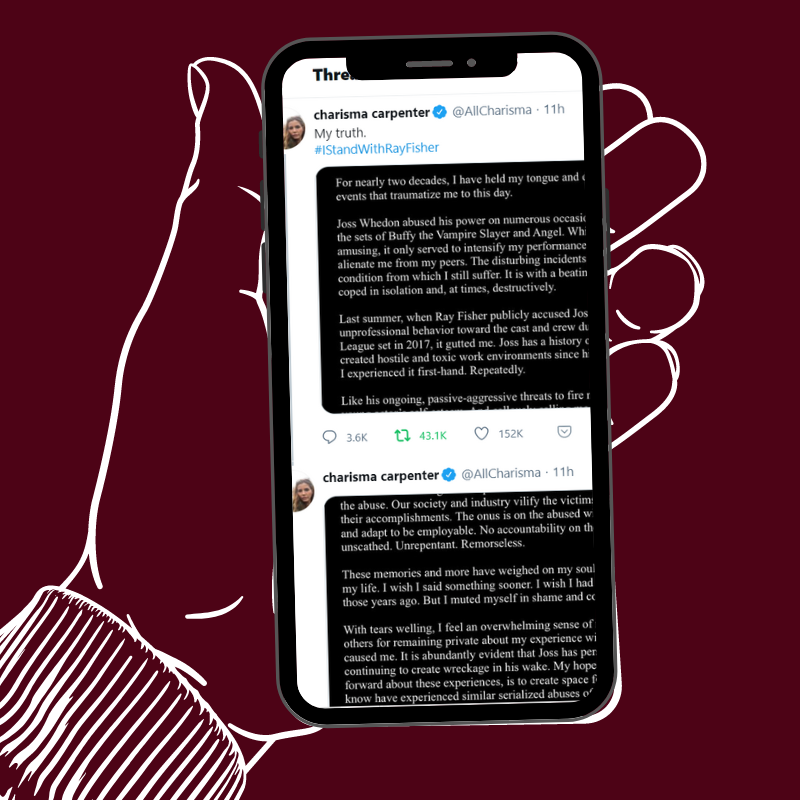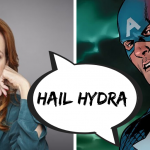The Whedonverse Has a Rowling-Sized Problem
 In response the the #IStandWithRayFisher hashtag on Twitter, Charisma Carpenter has come out with accusations of mistreatment and abuse by Joss Whedon during the filming of Buffy the Vampire Slayer. In the past she has been pressured to minimize the situation or even support Whedon, but it seems she’s done being quiet.
In response the the #IStandWithRayFisher hashtag on Twitter, Charisma Carpenter has come out with accusations of mistreatment and abuse by Joss Whedon during the filming of Buffy the Vampire Slayer. In the past she has been pressured to minimize the situation or even support Whedon, but it seems she’s done being quiet.
Reader warning: This article contains discussions of abuse and mistreatment in the context of what Charisma Carpenter endured. While this article itself isn’t graphic, links within describe the abuse in more detail.
On February 10, Charisma Carpenter, who played Cordelia Chase in both Buffy the Vampire Slayer and Angel, tweeted credible accusations of mistreatment and abuse by Joss Whedon. She writes that she “participated in WarnerMedia’s investigation of Justice League because [she believes] Ray [Fisher] to be a person of integrity and is telling the truth.”

She joins Ray Fisher in alleging misconduct, abuse, and creation of “hostile and toxic work environments” by the director. Standing with them are fellow Whedonverse alums Michelle Trachtenberg and Sarah Michelle Gellar, as well as stuntwoman and other cast and crew who worked with Whedon over the years.
Carpenter’s tweet includes a harrowing anecdote where Whedon, on being told she was expecting, asked her if she intended to “keep her pregnancy”. He also called her “fat” when she was four months pregnant, and he constantly threatened to fire her (and did soon after she gave birth to her son).
You can read Carpenter’s full Tweet embedded below:
My truth. #IStandWithRayFisher pic.twitter.com/eNjYcJ6zwP
— charisma carpenter (@AllCharisma) February 10, 2021
https://platform.twitter.com/widgets.js
Now the various fandoms of the Whedonverse have to contend with a problem that is becoming all too common: what do we do when a creator is flawed but their creations have inspired us?
Make no mistake: both DC and the MCU will now have to decide if they are willing to stand behind a director and writer. Given the MCU’s treatment of James Gunn, it seems likely that Whedon will face consequences with either or both franchises, and possibly Hollywood at large. There should be consequences. Reckoning with abusive people in power not only should be done- it must be done.
But what are we to do with the existing Whedonverse? The people who grew up with Buffy as a Strong Female Character or watched Hoban Washburne soar like a leaf on the wind- are they to forget the formative heroes of their childhoods and teen years? Are they never to play “Once More, With Feeling” at full volume in their car? Can they never again sing along with Dr. Horrible about changing the world with a freeze ray?
Another fandom has been contending with a similar issue: the Potterverse has had to come to grips with J.K. Rowling’s inexcusable TERFitude. While a whole range of responses are expected and valid, a consensus was found on Twitter: cancel J.K. Rowling, not Harry Potter. This consensus has been joined by Daniel Radcliffe, Rupert Grint, Emma Watson, and other stars of the franchise. #RIPJKRowling.

This gets to the heart of an argument that has been going on in literary debates for decades: can we separate an author from his work? Can we find value and meaning beyond the author’s own personal views or original intent? Despite Hemingway’s deep misogyny, can we find Brett a feminist character, or The Sun Also Rises a feminist work?
The short answer is yes. Meaning in a work of fiction is intensely personal, and the messages in Harry Potter about inclusion and acceptance are no less valid because the author spewed vile, intolerant garbage elsewhere.
Similarly, the themes in Whedon’s past work about female empowerment, acceptance, friendship, love, growth, and fighting the patriarchy are valid as well, no matter what abusive behavior he displayed to his actors, his stuntpeople, and doubtless his crews over the years.
Some people will not be able to separate a work from its author, and will never watch a show or movie by Whedon ever again. This, and I cannot stress this enough, is a valid response that needs no explanation or qualification. Others have found a way through depression, inspiration, or comfort in a Whedon work, and will feel torn about returning to the familiar characters and stories that helped them. Seeking that comfort and nostalgia is also valid, and is also ok.
Ultimately, the question we have to ask now is: how do we support Whedon’s victims? We know that Whedon is unlikely (now extremely unlikely) to return for the Firefly reboot on Disney+; but what about Ray Fisher and Charisma Carpenter and the countless others who were affected by Whedon’s actions?
The first step is: believe them. I do. #RIPWhedon
Author: K. P. Wilson
Help support independent journalism. Subscribe to our Patreon.
Copyright © The Geekiary
Do not copy our content in whole to other websites. If you are reading this anywhere besides TheGeekiary.com, it has been stolen.Read our






